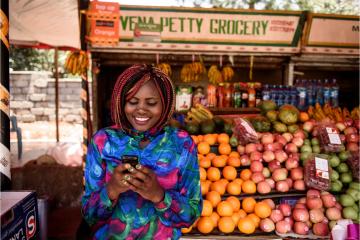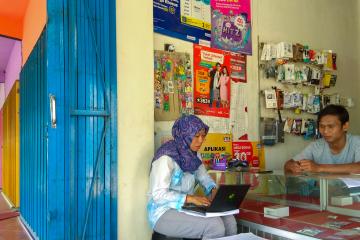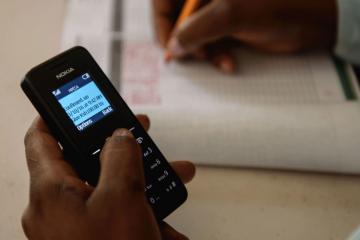
Building back better: Catalyzing digital financial services for women across Africa

“We must focus on the infrastructure to digitize, direct and deliver this economic support to the women who need it most.” -Melinda Gates
The G7 Partnership on Women's Digital Financial Inclusion in Africa, of which J-PAL Africa’s Digital Identification and Finance Initiative (DigiFI Africa) is a participant, recently held its first annual event focused on Catalyzing Digital Financial Services for Women Across Africa: Supporting Recovery, Resilience, and Innovation During COVID-19.
The session brought together Melinda Gates; H.M. Queen Máxima of the Netherlands; Cyril Ramaphosa, President of South Africa; H.E. Nicolas de Rivière, Permanent Representative of France to the United Nations; as well as a panel of leaders in the public, private, and academic sectors to discuss financial inclusion and economic resilience for women in Africa.
The event highlighted how the COVID-19 pandemic has disproportionately impacted women, particularly across the African continent, and the need for African governments and donors to accelerate investments in digital financial inclusion to support women, many of whom are among the most marginalized.
Queen Máxima, attending in her capacity as the UN Secretary-General's Special Advocate for Inclusive Finance for Development, highlighted the importance of prerequisite infrastructure to facilitate women’s economic empowerment.
Melinda Gates spoke about the way that women’s economic empowerment is linked to digital financial services. In particular, she highlighted the importance of emergency cash transfers to women as a government response during the pandemic—with digital payment systems and digital IDs at the core—to ensure that these transfers end up in women’s pockets, not their husbands or other male family members.
Commitments were made from South Africa’s President Cyril Ramaphosa to ensure women’s digital financial inclusion. South Africa made a commitment of $500,000 to the South African Women Impact Fund, which seeks to empower women financially. In addition, the President announced that 40 percent of all public procurement will be reserved for women-owned businesses.
A strong country contribution was echoed by the H.E. Nicolas de Rivière, who made a call to action for the donor community in the women’s empowerment space.
Digital money plays an important role in poverty alleviation and economic resilience.
Based on her seminal work on digital money and poverty and recent study on the impact of digital cash transfers, Tavneet Suri, DigiFI’s chair, highlighted key research findings on digital money. She discussed her work on mobile money (MPESA) in Kenya, which finds that MPESA strengthens the ability of households to overcome unexpected adverse events, for example a drought, floods or a child falling ill. In addition, when a household is less vulnerable to these adverse events, they make higher return investments because they know they are protected against the unexpected risk.
On average, the researchers saw an overall reduction in poverty with effects larger for female-headed households. These gender effects were driven by women switching occupations, largely moving from farming to small-scale retail.
Similar resilience effects have been documented in Uganda, Mozambique, Tanzania and Bangladesh.
Tavneet also spoke about her work in the context of COVID-19 in Kenya. Early findings of her research show that individuals receiving digital transfers through mobile money were able to improve their food security, and physical and mental health, prior to and even in the wake of the pandemic.
In order to financially include women, governments, and service providers need to focus on access, quality of usage, and value-add for women.
As Dr. Benno Ndulu, co-director of the Pathways for Prosperity Commission and member of the World Bank’s ID4D High-Level Advisory Council, highlighted, governments must design digital public goods and regulations based on women’s needs.
Dr. Ndulu illustrated his points by featuring the needs of cross-border traders, who are mostly female. In order to trade in a different country, traders need a widely recognized ID, and digital transactions should be easy to understand and convenient. Her transactions can be made wherever she does business, facilitated by a low-cost payment system that can work across vendors, and the transaction needs to be reliable and secure.
Despite its devastating effects, COVID-19 has also opened the door for innovative and lasting solutions—accelerating new digital approaches across the continent.
Many African countries have expanded their government social transfer programs to limit the economic hardships caused by the pandemic.
Cina Lawson, Minister of Posts, Digital Economy, and Technical Innovation for the Republic of Togo, detailed the success of the country’s recent emergency cash transfer program, Novissi. This transfer was 100 percent digital and was targeted to households in the informal sector.
In order to serve women successfully, she highlighted the importance of gender disaggregated data, digital ID, and social registry systems. She emphasized the need for governments to establish trust with the recipients through value-add services, consistent communications, and a redressal mechanism to address grievances. Novissi used the national voter ID database from the February 2020 elections, which included location and occupation of voters, to identify beneficiaries of the program, and early next year the government is looking to roll out a national biometric ID, with links to mobile money wallets, to assist with a more sustained system of identification to better target social protection programs in Togo moving forward.
A regulatory environment that protects consumers, interoperable payment systems, and inclusive financial regulations and policies are critical to reducing the digital divide and safeguarding the use of new technologies.
Having the right regulation and consumer protection policies in place are essential to mitigating risk. In addition, there is a need to garner consumer trust, and help guarantee that the use of and access to digital financial services does not further gender inequity.
With nearly 90 percent of women in sub-Saharan Africa working informally, often across borders, Dr. Eyob Tekalign Tolina, State Minister, Ministry of Finance, for Ethiopia emphasized the importance of accelerating the use of digital interoperable payment infrastructure that considers cross-border traders and merchants and enables them to transact with others, regardless of the service provider.
Cross-sector collaboration is essential for developing innovative digital solutions.
Patricia Obo-Nai, CEO of Vodafone Ghana, underscored the need for more cross-sector collaboration to broaden the digitization of services and expand mobile networks.
In particular where financial inclusion rates are high, Ms. Obo-Nai emphasized the importance of the role governments can play to support greater usage by encouraging wage digitization, digitizing government services, and delivering value to consumers through access to affordable credit.
DigiFI Africa is excited to be a pillar of the G7 partnership and looks forward to unpacking more evidence on the impacts of digital financial services on women in sub-Saharan Africa.
Watch the full event recording below, and contact us to learn more about our research agenda and the potential for collaboration.
Related Content

DigiFI Africa: A pillar of the G7 Partnership for Women’s Digital Financial Inclusion in Africa

How digital financial services and e-commerce can help curb the impact of COVID-19 on people's livelihoods


